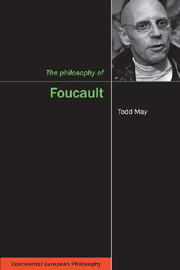Book contents
- Frontmatter
- Contents
- Abbreviations
- Acknowledgements
- 1 Introduction: who are we?
- 2 Archaeological histories of who we are
- 3 Genealogical histories of who we are
- 4 Who we are and who we might be
- 5 Coda: Foucault's own straying afield
- 6 Are we still who Foucault says we are?
- Notes
- Further reading
- References
- Index
4 - Who we are and who we might be
- Frontmatter
- Contents
- Abbreviations
- Acknowledgements
- 1 Introduction: who are we?
- 2 Archaeological histories of who we are
- 3 Genealogical histories of who we are
- 4 Who we are and who we might be
- 5 Coda: Foucault's own straying afield
- 6 Are we still who Foucault says we are?
- Notes
- Further reading
- References
- Index
Summary
The Archaeology of Knowledge is published in 1969. Between 1961 and 1969 Foucault publishes six books. He does not publish another one until the first genealogy appears in 1975, followed by the first volume of the history of sexuality a year later. By then there are new themes, such as power, and a new methodology, that of genealogy. The first volume on sex promises several more to follow:
[T]he domain we must analyze in the different studies that will follow the present volume is that deployment of sexuality: its formation on the basis of the Christian notion of the flesh, and its development through the four great strategies that were deployed in the nineteenth century: the sexualization of children, the hysterization of women, the specification of the perverted, and the regulation of populations.
(HS: 113–14)In 1984, the second and third volumes are published. They appear just before Foucault's death. And in them there are new themes, a new chronology, and a new approach, an approach that Foucault sometimes labels ethics.
Ethics
We already know that Foucault is resistant to patrolling the same intellectual territory. He has told us in The Archaeology of Knowledge that it is not for him to keep his papers in order, but for bureaucrats and the police. He says much the same thing in his preface to the second volume of the history of sexuality, The Use of Pleasure, when he tells us that what motivated him is a curiosity that allows him to “stray afield” of himself.
- Type
- Chapter
- Information
- The Philosophy of Foucault , pp. 96 - 125Publisher: Acumen PublishingPrint publication year: 2006
- 1
- Cited by



